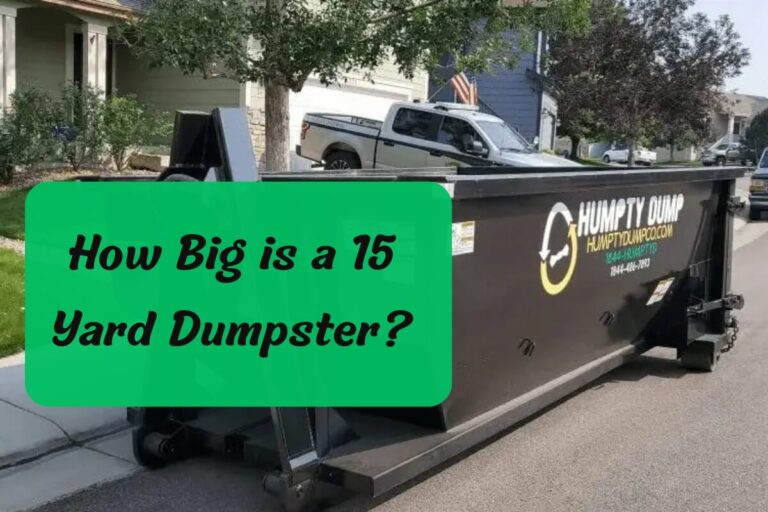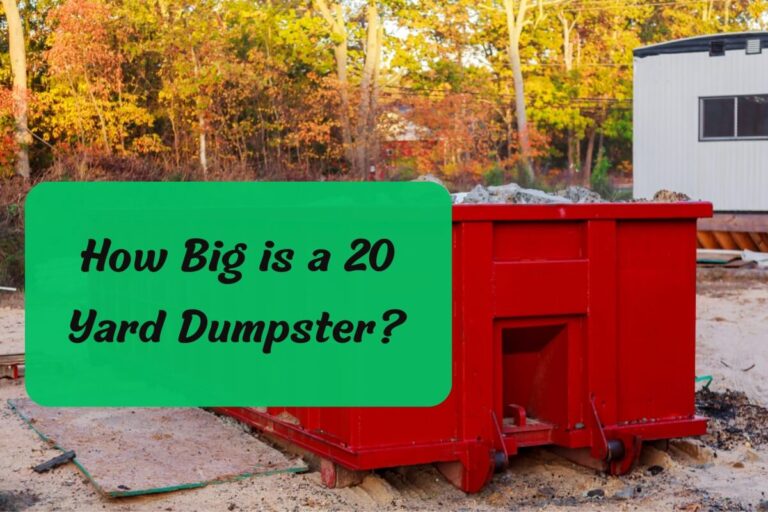From home decluttering projects to major renovations or constructions, there always comes a point when you need to get rid of a large amount of waste materials and debris. Renting a dumpster is often the most efficient and affordable solution for disposing of bulk garbage.
However, with dumpsters available in various sizes, how do you know how big of a dumpster you need for your specific project?
The ideal dumpster size depends on factors like the type and total volume of debris, the weight of materials, available space for the dumpster, and project scope. This guide will cover all those considerations to help ensure you rent the perfect-sized roll-off dumpster.
We’ll explore:
- Common dumpster size options and dimensions
- How to estimate your debris volume and weight
- Recommended dumpster sizes for different projects
- Tips for choosing if you’re unsure of the right fit
- Pricing, permitting, and logistics to plan for
Let’s start by understanding what dumpster sizes are out there to choose from.
What Are Common Dumpster Sizes?
When renting a roll-off dumpster, you’ll typically find sizes measured in cubic yards, which indicates their total volume capacity. The most common residential and commercial sizes are:
- 10 cubic yard dumpsters
- 15 cubic yard dumpsters
- 20 cubic yard dumpsters
- 30 cubic yard dumpsters
- 40 cubic yard dumpsters
In addition to total volume, each size has standard exterior dimensions and an associated weight limit:
10 Yard Dumpsters
- Dimensions: 14ft long x 7.5ft wide x 3.5ft high
- Weight Limit: Around 2-3 tons or 4,000-6,000 lbs
- Best for: Small cleanups like attic, garage, or basement debris
15 Yard Dumpsters
- Dimensions: 16ft long x 7.5ft wide x 4.5ft high
- Weight Limit: Around 2-3 tons or 4,000-6,000 lbs
- Best for: Larger residential projects like decluttering or remodeling a room
20 Yard Dumpsters
- Dimensions: 22ft long x 7.5ft wide x 4.5ft high
- Weight Limit: Around 3-4 tons or 6,000-8,000 lbs
- Best for: Home renovations, roofing, larger remodels, landscaping
30 Yard Dumpsters
- Dimensions: 22ft long x 7.5ft wide x 6ft high
- Weight Limit: Around 3.5-5 tons or 7,000-10,000 lbs
- Best for: New home construction, demolition, major renovation projects
40 Yard Dumpsters
- Dimensions: 22ft long x 7.5ft wide x 8ft high
- Weight Limit: Around 5-6 tons or 10,000-12,000 lbs
- Best for: Commercial construction sites, extremely large cleanouts
Keep in mind that maximum weight limits and even dimensions can vary slightly by dumpster company and location. But this gives you a general sense of dumpster sizing options.
Factors to Consider When Choosing a Dumpster Size
To determine how big of a dumpster you need for your specific project, there are four main factors to assess:
Type of Debris
The nature of your waste materials makes a big difference. Are you disposing of light, bulky household items and furniture? Or are you dealing with heavy construction and demolition debris like:
- Concrete
- Roofing shingles
- Bricks and blocks
- Plaster and drywall
- Lumber and wood
- Yard waste like stumps, soil, branches
Heavy debris is very dense and weighs much more than an equivalent volume of household junk. A couch may fit easily into a 10-yard dumpster, but concrete from even a small demolition may require a larger 20 or 30-yard container to avoid exceeding weight limits.
Special disposal considerations may also be needed if your debris includes any hazardous materials that require careful handling.
Total Debris Volume
Along with material density, you’ll need to account for the sheer amount and total volume of debris and waste you need to dispose of. Helpful measurements to estimate include:
- Number of rooms or square footage involved
- Approximate number of bins, truckloads, or trash bags of debris
- Size of renovation area or demolition zone
As a rough guideline, one cubic yard is equal to around six standard 13-gallon trash bags. So a 10-yard dumpster can hold about 60 bags, while a 40-yard container fits roughly 250 bags worth of materials.
Visualizing in terms of truck beds can also help. A 10-yard dumpster equates to around four standard pickup truck loads of debris.
Total Weight Considerations
Every dumpster rental has a maximum weight limit to ensure debris can be safely hauled away without any issues. As we covered, typical limits are:
- 10-15 yard dumpsters: 4,000 – 6,000 lbs
- 20-yard dumpsters: 6,000 – 8,000 lbs
- 30-yard dumpsters: 7,000 – 10,000 lbs
- 40-yard dumpsters: 10,000 – 12,000 lbs
Exceeding that maximum risks potential fines or fees from the rental company. So even if the stated volume of the dumpster seems sufficient, ensure it can also handle the total weight of materials you’ll load in.
Heavy debris like concrete, bricks, and roofing almost always necessitates renting a smaller dumpster size – even for lower total volumes – to stay within weight guidelines.
Available Space for Dumpster Placement
Finally, consider the area and clearance space you have for placing the rented dumpster during your project. Larger sizes simply may not fit in a tight driveway or residential area. Most dumpster companies require:
- At least 24′ of straight clearance for a 20-yard dumpster
- Around 27′ of clearance space for 30 and 40-yard sizes
- Minimum overhead clearance of 25′ to avoid obstacles like tree branches or power lines
Walk your property and note any potential obstructions like fences, low-hanging wires, narrow pathways, or entrances that could restrict dumpster access. If space is very limited, you may need to schedule periodic swap-outs of a smaller dumpster as it fills up.
Dumpster Size Recommendations By Project Type
With those key factors in mind, let’s look at typical dumpster rental size recommendations for some of the most common projects:
Home Cleanouts & Decluttering Suggested size: 10-20 yard dumpster
For whole-home junk removal, decluttering, or even an estate cleanout situation, dumpsters in the 10-20 yard range work well. A 10-yard dumpster is ideal for smaller homes or just cleaning out a single room or two. But if you’re clearing out an entire house, multiple rooms, or a good amount of furniture and bulky items, opt for the larger 20-yard container.
Bathroom Remodel Suggested size: 10-15 yard dumpster
A bathroom demolition and remodel creates a contained amount of debris, with drywall, fixtures, tiles, and construction waste. For small-to-average-sized bathrooms, you can usually get by with a 10-yard roll-off. But if removing a jacuzzi tub and tackling a very large master bath, you may want to size up to 15 yards.
Kitchen Remodel Suggested size: 20-30 yard dumpster
Kitchens are one of the more debris-heavy remodels. All of those appliances, heavy countertops, cabinets, flooring, and construction materials can require a good bit of dumpster space. For an average kitchen remodel, plan on renting a 20-yard dumpster. For an extremely large or higher-end kitchen with lots of materials, a 30-yard dumpster gives you that extra capacity.
Home Renovation or Addition Suggested size: 20-30 yard dumpster
Home renovations encompass everything from interior remodels and framing to roofing, siding, and drywall work. The same usually goes for putting on any kind of addition to your home.
For these larger-scale residential projects, a 20 or 30-yard dumpster is most often recommended. The 20-yard option works for more modest renovations, while going up to 30 yards gives you much more capacity for major additions or gut rehabs.
New Home Construction
Suggested size: 30-40 yard dumpster
When constructing a new house from the ground up, you’re dealing with massive amounts of waste materials from every part of the building process. Concrete, lumber, drywall, roofing, and more will require a high-volume dumpster to handle it all efficiently. Most contractors opt for 30-yard or even 40-yard sizes to ensure they have enough space for construction debris.
The same goes for demolition projects of any existing house or building structure. You’ll want to rent one of the largest dumpster sizes to accommodate all of that heavy debris.
Roofing Projects
Suggested size: 20-30 yard dumpster
While roofing jobs may seem contained, those shingles, underlayment, and roofing materials are dense and heavy. Even roofing just an average-sized home often requires at minimum a 20-yard dumpster, if not a 30-yard, to fit all of the debris and stay within weight limits.
For larger roofs or commercial roofing projects, you’ll likely want to rent a 30-yard dumpster to ensure you have the needed capacity. Roofers should also consider using specialty dumpsters made of heavy inert materials.
Landscaping and Yard Work Suggested size: 10-20 yard dumpster
Dumpster needs can vary quite a bit for different landscaping projects. For basic projects like clearing brush, leaves, and lighter yard waste, a 10-yard dumpster may suffice. But for major landscaping involving dirt, soil, tree stump removal, fencing, and other heavier green waste, you’ll probably want to rent a larger 20-yard container.
What If I Choose the Wrong Dumpster Size?
Even after evaluating your project, you may underestimate the needed dumpster size and end up with one that’s too small. If materials start piling up beyond what can safely fit, you’ll have a couple of options but both involve additional costs.
The first solution is to have the dumpster rental company swap out your full, smaller dumpster for an empty larger size midway through your project. You’ll incur rental fees for each dumpster used.
Alternatively, the company may allow you to keep overfilling the dumpster, but you’ll likely face weight overage fees that can quickly get expensive.
The better move is simply overestimating your dumpster size needs from the start, even if it costs a bit more upfront. An ample dumpster size makes the whole job easier, more efficient and avoids surprise fees later. When in doubt, go with a slightly larger container than you think you need.
Tips for Choosing the Right Dumpster Size
Feeling a bit overwhelmed by all the sizing factors and options? Here are some tips to help you pick the right roll-off dumpster for your particular project:
- Walk through the job site and make notes on the amount and types of debris
- Snap photos to share with dumpster rental companies for advice
- Measure any tight spaces or overhead obstacles near the drop spot
- Ask about weight limits and dumpster swapping policies upfront
- Consider renting a slightly larger size than you think for breathing room
- For mixed/heavy debris, choose a dumpster meant for higher-weight capacities
The dumpster rental company should be able to guide you through the process as well. Explain your project, the materials involved, and the potential dumpster location. Most can quickly assess your needs and make an informed size recommendation.
Final Reminders about Dumpster Rental Logistics
Beyond just dumpster sizing, there are a few other tips and logistics to keep in mind when renting a roll-off container:
- Permits may be required if keeping the dumpster on public streets
- Check for any low-hanging wires or obstacles on the drop-off path
- Make the dumpster accessible for easy pickup and swapping if needed
- Load heavier debris towards the rear for better weight distribution
- Schedule the rental and dump runs to align with your project timeline
- Consider a dumpster with a walk-in door if disposing of many bulky items
Following best practices like these ensures the dumpster rental process goes smoothly from delivery to final pickup. Proper planning prevents headaches when tackling any big home project.
Ready to Rent the Right Size Dumpster?
At this point, you should have a solid understanding of how to choose the right sized dumpster based on factors like debris type and volume, available space, scope of the project, and more.
Always feel free to lean on advice from experienced dumpster rental companies as well. With their expertise, they can recommend the ideal dumpster size that fits your specific needs and location.
So whether you’re doing light decluttering or major construction, you can feel confident renting an appropriately sized roll-off container. With the proper dumpster on-site, your waste removal will be a total breeze!


